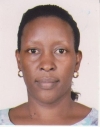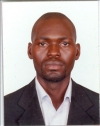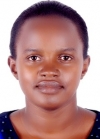Joseph Ochieng
ID:
|
Genetics and genomics research in Uganda: Towards context-specific ethics guidelines
REFNo: SS268ES
1. Assess stakeholder awareness of GGR, and the nature of ethical and social concerns associated with GGR in Uganda, to better understand local needs and issues and provide robust data for later guideline development
2. Evaluate existing guidance and guidelines on the ethics and oversight of GGR for applicability to the Ugandan setting, with a particular emphasis on guidance and guidelines developed by and for Africa.
3. Develop and disseminate a model guideline for the ethics of GGR in Uganda.
|
Uganda |
2019-03-14 |
2022-03-14 |
Social Science and Humanities |
|
Non-degree Award |

|
Hellen Opolot
ID: UNCST-2019-R001724
|
A BASELINE ASSESSMENT OF THE ETHICS AND REGULATORY REVIEW PROCESSES FOR CLINICAL TRIALS REGISTERED IN UGANDA BETWEEN JANUARY 2016 AND JULY 2017
REFNo: SS276ES
1. To establish the turnaround times for clinical trial applications reviewed by the Research Ethics Committees and the NRAs in Uganda between January 2016 and July 2017.
2. To document the challenges faced by each stakeholder group along the regulatory review pathway during the study period.
3. To document possible solutions to identified challenges and make some best-practice recommendations that could potentially improve efficiency in the ethics and regulatory review process for clinical trials in Uganda.
|
Uganda |
2019-03-14 |
2022-03-14 |
Social Science and Humanities |
|
Non-degree Award |

|
Elizabeth Namukwaya
ID:
|
“Understanding data and information needs for palliative care to target mobile –phone based intervention development in Uganda and Zimbabweâ€
REFNo: HS325ES
1. Establish a consortium of academic researchers (from Uganda, the UK and Zimbabwe) including our research team, non-governmental organisations, palliative care providers, policymakers and mHealth development and implementation expertise, to catalyse mHealth research and generate evidence that can guide palliative cancer care development across sub-Saharan Africa
2. Understand the acceptability and optimal implementation of patient-level data collection (e.g. patient-reported outcome measures and patient-reported experience measures) using mHealth approaches in Uganda and Zimbabwe through patient and caregiver engagement
3. Determine information needs and pathways for leveraging evidence generated from mHealth approaches in service development in Uganda and Zimbabwe through health professional and service manager engagement
4. Determine information needs and pathways for leveraging evidence generated from mHealth approaches in policymaking in Uganda and Zimbabwe through policymaker engagement
5. Define the mechanisms for implementation of mHealth approaches to support development of palliative cancer care in sub-Saharan Africa
|
Uganda |
2019-03-14 |
2022-03-14 |
Medical and Health Sciences |
|
Non-degree Award |

|
ERIC WOBUDEYA
ID: UNCST-2019-R001047
|
IMPACT OF SYSTEMATIC EARLY TUBERCULOSIS DETECTION USING XPERT MTB/RIF ULTRA IN CHILDREN WITH SEVERE PNEUMONIA IN HIGH TUBERCULOSIS BURDEN COUNTRIES
REFNo: HS331ES
To evaluate the impact on all-cause mortality at 12 weeks of adding systematic early detection of TB with Xpert MTB/RIF Ultra performed on one NPA and one stool sample to the WHO standard of care (SOC) in young children with severe pneumonia, followed by immediate anti-TB treatment initiation in children with a positive Ultra result, in high TB incidence countries, as compared to the SOC alone.
|
Uganda |
2019-03-14 |
2022-03-14 |
Medical and Health Sciences |
|
Non-degree Award |

|
Satoru Mikami
ID: UNCST-2019-R000358
|
The Effect of Participation and Alignment on the Sustainability of Development Aid: Evidence from a Field Experiment of a Household Water Treatment and Safe Storage Project in Uganda
REFNo: SS285ES
The purpose of this study is to explore the ways in which development aid can become more sustainable and effective. Among others, this study focuses on the impact of participation and alignment on the stainability of aid projects. However, it would be futile to directly ask stakeholders about their opinions on the contested impact of participation and alignment on sustainability because their opinions are driven more by ideology than by analysis. Therefore, this study uses a specific, concrete field situation where abstract relationships between participation, alignment and sustainability can be translated into actual behaviours.
|
Japan |
2019-03-14 |
2022-03-14 |
Social Science and Humanities |
|
Non-degree Award |

|
Hella Peter Eszter
ID:
|
Variation in the leaf-tools of wild chimpanzees: Budongo Forest Reserve
REFNo: NS77ES
This research examines leaf-tool use and repertoire in the Budongo Forest Reserve, Uganda. In the forest, there are two habituated chimpanzee communities: Waibira, where habituation started in 2011, and Sonso, where habituation started in 1990. Both groups have a unique tool repertoire, without any stick or stone based tools, as opposed to those described at other long-term chimpanzee field sites. Additionally, the Waibira group faces an unusual ecological pressure during the dry season, when, despite being a forest living group, all permanent sources of water dry up. Describing their tool repertoire and investigating how it differs from the neighbouring Sonso community, who have permanent water sources all year around, will shed light on the ecological and social pressures driving the development of tool use.
The project aims to provide a detailed description of the leaf-tool use of the Waibira chimpanzees of the Budongo forest, during the dry season lasting from December to end of February. Other aims are to determine variables that influence the use of leaf-tools, accurately measure leaf tools, and draw a developmental timeline for the most common type of leaf-tool, leaf-sponging. This will allow for detailed description of the leaf-tools of the community.
|
Hungary |
2019-03-11 |
2022-03-11 |
Natural Sciences |
|
Degree Award |

|
Stephen Ssematimba Kato
ID:
|
PREGNANCY OUTCOME AMONG WOMEN OF ADVANCED MATERNAL AGE WHO DELIVER IN MULAGO HOSPITAL.
REFNo: HS260ES
General objective
1) To determine the association between advanced maternal age and adverse pregnancy outcomes among women who deliver in Mulago hospital.
Specific objectives
1. To determine whether advanced maternal age is associated with adverse maternal outcomes in mothers who deliver from Mulago hospital.
2. To determine whether advanced maternal age is associated with adverse perinatal outcomes among mothers who deliver from Mulago hospital
|
Uganda |
2019-02-26 |
2022-02-26 |
Medical and Health Sciences |
|
Degree Award |
.JPG)
|
Ravinder Bhavnani D
ID:
|
MERIAM: Modelling Early Risk Indicators to Anticipate Malnutrition
REFNo: HS245ES
The central aim of the MERIAM project is to identify, test and scale up cost-effective means to improve the prediction and monitoring of undernutrition in difficult contexts, in such a way that it enables an effective response to manage and mitigate nutritional risk. The objectives of the overall, multi-year multi-country MERIAM research project include:
(a) the creation of high-quality, relevant research that fills gaps in the evidence base on the prediction of undernutrition in response to shocks (e.g., conflict, drought, spikes in food prices);
(b) the accessibility of results and evidence to both technical and non-technical audiences, including facilitation of audience engagement with data and the predictive model via a user-friendly online platform; and,
(c) the successful uptake of MERIAM research by key stakeholders in policy and practice, with a focus on national-level actors and their utilization of the data and analysis to inform humanitarian response.
The objectives of the Uganda-specific field visit for the computational modelling component include:
(1) Visit locations where nutrition crises have occurred to get an understanding of the context, terrain, conditions, and populations
(2) Administer questionnaires to identify and gauge key attributes, assets, choice sets, behavioral rules and practices (including adaptation and learning), drivers, constraints, and interventions.
(3) Conduct simple vignette-based experiments where interviewees are presented with scenarios to which they answer with how they would respond to or judge various situations
(4) Conduct open-ended discussions to make “explicit†the mental models practitioners use for assessment and decision-making
|
USA |
2019-02-26 |
2022-02-26 |
Medical and Health Sciences |
|
Non-degree Award |

|
Gavin Ackers Johnson
ID:
|
Assessing the Resistance Patterns of Bacteria Isolated from Cases of Maternal Sepsis at Fort Portal Regional Referral Hospital, Uganda; and Further Investigating the Potential Mechanisms of Antibiotic Resistance in the Staphylococcus aureus isolates obtai
REFNo: HS249ES
1. To determine the most common bacterial species that are associated with maternal sepsis at Fort Portal Regional Referral Hospital and their resistance profiles.
2. To use molecular typing to assess Staphylococcus aureus isolates and determine whether patients are being infected by the same strains, which may provide clues as to sources of infection
3. To identify the mechanisms of any antibiotic resistance observed.
|
UK |
2019-02-26 |
2022-02-26 |
Medical and Health Sciences |
|
Degree Award |

|
Agnes Kiragga
ID:
|
A Pilot Test of a Technology-delivered HIV Self-Testing Intervention in Kampala, Uganda
REFNo: HS307ES
1) An established 24-hour call-in center staffed by medical providers who will deliver accurate HIV/STI information, perform pre- and post-test counselling, assist with conducting HIVST and interpreting the HIVST results, and referral and linkage to appropriate post-test prevention and treatment care; and
2) The use of SMS and social media streams – specifically private Facebook and Twitter messages - to “push†theoretically-grounded messages that promote HIVST and provide additional private communication routes between participants and medical provider research staff. The study aims are:
Aim 1: Develop HIVST messages and finalize study procedures and materials with input from a Community Advisory Board (CAB), and beta test the intervention with 6 sexually active Ugandan adults (18-49 years old; 50% female).
Aim 2: Using a pre-post design, assess the feasibility, acceptability and preliminary impact of the HIVST intervention developed in Aim 1 for Ugandan adults (n=100; 70% 18-24 years old, 30% 25-49 years old; 50% female). Feasibility will be assessed by whether enrollment targets are reached and the proportion of completed 1- and 3-month follow-ups calls. Acceptability items will be gathered at 1- and 3-month assessments. Preliminary impact will be determined by the percentage of participants who perform HIVST in the 3 months after enrollment.
Aim 3: Analyze process indicators of the overall use of the HIVST intervention, including the number of HIVST kits requested, the volume of callers requesting HIVST during the study period, the number of persons calling for assistance with self-testing procedures, the number of post-test counseling calls received, and the number of persons linked to follow-up prevention and care services.
|
Uganda |
2019-02-26 |
2022-02-26 |
Medical and Health Sciences |
|
Non-degree Award |

|
Julie Hennegan Maree
ID:
|
Assessing girls’ menstrual practices and experience: development of a menstrual practices questionnaire and the menstrual perceptions scale.
REFNo: SS279ES
Background
After a history of neglect and taboo, the role of the menstruation in women and girls’ dignity, health, education, employment, and wellbeing has begun to receive attention. Stakeholders from governments to local charities have started to recognize the barriers that poor menstrual management and menstrual stigma present to gender equality. This has resulted in a rapid increase in the dissemination of interventions; from small-scale sanitary pad or puberty education provision to national policies such as large-scale sanitary pad distribution for schoolgirls in Ghana and Kenya. Despite this increased action, there is limited research available to inform intervention development or evaluation.
There is a lack of comprehensive, validated survey tools with which to measure women and girls’ menstrual practices and experiences. This limits the quality of cross-sectional and intervention research as well as monitoring and evaluation by NGOs and governments.
General Objective
This project aims to improve the measurement of menstrual practices and experiences in low resource settings through field testing and assessment of the psychometric properties of new measures of practices and perceptions.
Specific Objectives
1. To field-test acceptability and responses to a newly developed Menstrual Practices Questionnaire (MPQ), and Menstrual Perceptions Scale (MPS).
2. To assess the test-retest reliability of the MPQ and MPS.
3. To assess the factor structure of the MPS through exploratory and confirmatory factor analysis.
4. To assess convergent and divergent validity of the MPS, that is, association of the scale scores with hypothesized correlates.
|
Australia |
2019-02-26 |
2022-02-26 |
Social Science and Humanities |
|
Non-degree Award |

|
Eve Smeltzer Ann
ID:
|
Conflict and Consensus: The Impacts of Socio-Ecological Contexts on Vervet Collaborative Movements
REFNo: NS83ES
This research will examine how vervet monkeys (Chlorocebus pygerythrus) use social strategies and democratic processes to mitigate conflicts of interests during collaborative movements and how their decisions are impacted by varying social and ecological contexts.
|
USA |
2019-02-19 |
2022-02-19 |
Natural Sciences |
|
Degree Award |

|
Denis Muhangi
ID:
|
ROLE OF ASFV LATENTLY INFECTED PIGS AND SOFT TICKS IN AFRICAN SWINE FEVER EPIDEMIOLOGY IN ACHOLI SUB REGION, NORTHERN UGANDA
REFNo: A40ES
(i) Establish the prevalence of ASFV latently infected pigs in a post-outbreak situation.
(ii) Investigate the existence of the soft tick O. moubata and their ASFV status.
|
Uganda |
2019-02-19 |
2022-02-19 |
Agricultural Sciences |
|
Non-degree Award |

|
Esther Uwimaana
ID:
|
Heme oxygenase-1 and neopterin plasma levels and their role in distinguishing active from latent TB in HIV/TB co-infected patients
REFNo: HS301ES
1. To determine and compare the median plasma levels of HO-1 1(in pg/ml) and neopterin (in ng/ml) among HIV patients co-infected with active TB, latent TB infection and individuals without TB infection alone attending Rubaga hospital.
2. To determine the diagnostic performance (sensitivity, specificity, positive predictive values and negative predictive values) of HO-1 and neopterin in diagnosis of latent tuberculosis infection using QuantiFERON2-TB test for latent TB infection as the gold standard.
3. To determine the diagnostic performance (sensitivity, specificity, positive predictive values and negative predictive values) of HO-1 and neopterin in diagnosis of active tuberculosis using sputum culture as the gold standard.
4. To determine the correlation between neopterin and HO-1 plasma levels with QuantiFERON2-TB Gold test in diagnosing latent TB infection.
|
Uganda |
2019-02-19 |
2022-02-19 |
Medical and Health Sciences |
|
Degree Award |

|
Kathryn LaRusso E
ID:
|
Access to Essential Surgical Care and Bellwether Procedures for Children in Uganda: A Public-Sector Evaluation
REFNo: HS231ES
Primary objectives:
1. To conduct a nationwide survey using a convenience sample of two regional and two general referral hospitals in each region (Northern, Eastern, Western, and Central) of Uganda, and the national referral hospital (17 total facilities), using surgical capacity assessments to assess the availability of essential and emergency surgical care (EESC) for children.
i. To pilot the new WHO-PGSSC-GICS Children’s Surgical Assessment Tool (CSAT) and compare the results with PediPIPES to assess the validity, usability and reliability of the new CSAT tool.
2. To identify candidate bellwether procedures for children’s surgery that can be used as a benchmark for essential surgical care for children based on national, regional and general hospital logbook data, surgical capacity assessments, and perioperative mortality if available.
Secondary objectives:
3. To identify if the ratio of emergent surgery to elective surgery (Ee ratio) using logbook data from national, regional and general hospitals can be a simple and valid indicator of access to pediatric surgical care.
4. To verify if a convenience sample of 1-month of logbook data collection can reliability predict perioperative mortality rate vs 3- or 6-months of logbook data collection at MRRH.
|
USA |
2019-02-18 |
2022-02-18 |
Medical and Health Sciences |
|
Non-degree Award |

|
Sarah Baird
ID:
|
INCORPORATING MENTAL HEALTH PROGRAMMING INTO ADOLESCENT EMPOWERMENT PROGRAMMING.
REFNo: HS318ES
Despite adolescent girls being at high risk of anxiety, depression, and other forms of psychological distress, there is little extant evidence on how to treat mood disorders among adolescents in developing countries in a cost-effective manner.
The aim of our research projects is to evaluate the use of group based interpersonal therapy (IPT-G) in reducing the prevalence of anxiety and depression among adolescents in developing countries.
The specific objectives of the research project are the following:
1. To estimate the causal effect of IPT-G on the psychological wellbeing of adolescent females who are identified as at risk of anxiety and depression at baseline
2. To estimate the marginal effects of adding income support following the intervention, on the sustainability of IPT-G results on anxiety and depression.
3. To investigate the relationship between improved psychological wellbeing among adolescents (as a result of the intervention) and school attainment, teenage pregnancy, child marriage and risky behavior.
4. To find if ELA clubs can serve as a pathway to reach and engage adolescent females who are most affected by mental health disorders.
|
New Zealand |
2019-02-12 |
2022-02-12 |
Medical and Health Sciences |
|
Non-degree Award |

|
GODFREY OSINDE
ID:
|
The association between ABCB1 gene C3435T polymorphism and Doxorubicin pharmacokinetics in Breast Cancer patients at Uganda Cancer Institute
REFNo: HS239ES
1. To determine the pharmacokinetics of doxorubicin in breast cancer patients in
Uganda. 2. To determine the frequencies of the ABCB1 gene: C3435T SNP in
breast cancer patients in Uganda. 3. To determine the association between the
ABCB1 gene: C3435T SNP and PK of doxorubicin in breast cancer patients.
|
Uganda |
2019-02-12 |
2022-02-12 |
Medical and Health Sciences |
|
Non-degree Award |

|
EMMANUEL NAMBALE BUKUWA NAMBALE
ID:
|
THE ROLE OF SAVINGS GROUPS ON SMALLHOLDER AGRO-INPUT USE IN SIRONKO DISTRICT, UGANDA
REFNo: A38ES
The main objective of this study is to investigate the impact of membership in a savings group on Agro-input use by smallholder farmers.
Specific objectives
1. To determine the proportion of group savings spent on agro-inputs by group members 2. To determine the difference in use of agro-inputs between members and non-members of savings groups
3. To identify factors determining the level of spending on agro-inputs
|
Uganda |
2019-02-12 |
2022-02-12 |
Agricultural Sciences |
|
Degree Award |

|
Provia Ainembabazi
ID:
|
BREAST CANCER RISK PERCEPTION AND RISK REDUCTION BEHAVIOURS OF FIRST DEGREE FEMALE RELATIVES OF BREAST CANCER PATIENTS AT UGANDA CANCER INSTITUTE, KAMPALA, UGANDA
REFNo: HS277ES
General Objective
The general objective of this study is to explore self-perceived risk of breast cancer and intentions for screening and adoption of risk reduction behaviors among first degree female relatives of breast cancer patients attending Uganda Cancer Institute so as to inform design of interventions to enhance uptake of early detection and prevention services.
Specific Objectives
1. To explore self-perceived risk of breast cancer and intended risk reduction behaviors among first degree female relatives of breast cancer patients at UCI.
2. To determine factors associated with self-perceived risk of breast cancer among the first degree female relatives of breast cancer patients at the UCI.
3. To determine the factors associated with risk-reduction behaviors among the first degree female relatives of breast cancer patients at UCI
4. To describe perceived barriers for adoption of risk reduction behaviors among first degree female relatives of breast cancer patients at the UCI.
|
Uganda |
2019-02-12 |
2022-02-12 |
Medical and Health Sciences |
|
Non-degree Award |

|
Stephen KIIRYA Kisembe
ID:
|
Psychosocial predictors of sexual risk behaviour among HIV infected and affected adolescents in HIV affected homes of Uganda
REFNo: SS270ES
Despite the long-lasting psychosocial impacts of HIV and the rising number of children progressing to adolescence and reproductive stages with HIV infection and or exposure in Uganda, the extent and factors of psychosocial and sexual risks among adolescents in HIV-exposed homes is unknown. Existing studies have ignored this population yet they are many and prone to psychosocial risks of HIV and focused on either older HIV-infected adolescents attending HIV care or young orphans. Additionally, these studies mainly examined levels and demographic factors of psychological distresses and risky sexual practices and do not therefore offer ample knowledge about the psychosocial situation and sexual risk behaviour among varied adolescents in HIV-affected homes to facilitate inclusive programming. This knowledge deficit begets three research questions, namely 1) What is the psychosocial and sexual risk behaviour situation of HIV infected and affected adolescents living in HIV-affected homes of Uganda? 2) How do HIV infected and affected adolescents compare concerning the psychosocial and sexual risk behaviour situations? 3) Does the psychosocial situation predict sexual risk behaviour in these groups?
The proposed research therefore aims to: 1) determine the psychosocial and sexual risk behaviour situation of HIV infected and affected adolescents in HIV-affected homes across three HIV-burdened districts in Uganda; 2) compare the socio-demographic contexts and levels of community stressors, psychosocial distresses, coping ways and sexual risk behaviours of the two groups; 3) examine the coping mediated psychosocial predictors of sexual risk behaviour in these groups; and 4) evaluate if socio-demographic factors (age, sex, etc.) moderate the coping mediated associations between community stressors, psychosocial distresses and sexual risk behaviour in this population.
|
Uganda |
2019-02-12 |
2022-02-12 |
Social Science and Humanities |
|
Degree Award |

|
| View |
|
Sort By: |
|
|
|
| |
|